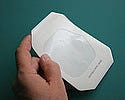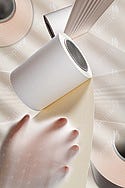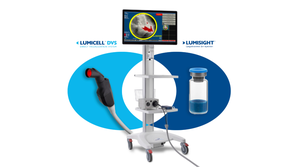June 9, 2009
Originally Published MPMN June 2009
SPOTLIGHT
Wound-Care Technologies
Antimicrobial compounds Antimicrobials can be compounded into a supplier’s thermoplastics to inhibit bacterial growth on the material. Suited for use in wound dressings and catheters, the compounds can help reduce the potential for infection, especially in hospital environments. Highly active against a range of bacteria, both organic and inorganic antimicrobials that target specific microorganisms are available. Selections include inorganic, silver-glass-based, or silver-zeolite-based antimicrobials; a glass-matrix or zeolite design enables controlled silver-ion release for longer life, according to the company. Antimicrobials can also be supplied as fully compounded or masterbatches in any color the customer chooses. Compounds can be formulated for injection molding, blow molding, blown film, sheet extrusion, profile extrusion, and rotational molding.
Antimicrobials can be compounded into a supplier’s thermoplastics to inhibit bacterial growth on the material. Suited for use in wound dressings and catheters, the compounds can help reduce the potential for infection, especially in hospital environments. Highly active against a range of bacteria, both organic and inorganic antimicrobials that target specific microorganisms are available. Selections include inorganic, silver-glass-based, or silver-zeolite-based antimicrobials; a glass-matrix or zeolite design enables controlled silver-ion release for longer life, according to the company. Antimicrobials can also be supplied as fully compounded or masterbatches in any color the customer chooses. Compounds can be formulated for injection molding, blow molding, blown film, sheet extrusion, profile extrusion, and rotational molding.
Chroma Corp.
McHenry, IL
www.chromacolors.com
Polyurethane films Designed for breathable wound dressings, border dressings, IV-site dressings, negative-pressure wound therapy, hydrocolloid dressings, incise drapes, island dressings, or frame dressings, a line of thermoplastic polyurethane (TPU) films are compatible with most medical-grade commercial adhesive systems. Soft and conformable for patient comfort, ArgoMed films also have good stretch and recovery and contain no plasticizers. Furthermore, the films can be engineered with Natural Elements antimicrobial technology, which can be formulated to tailor the strength and timing of the antimicrobial to the end use of the film. Extruded from aliphatic or aromatic TPU in thicknesses ranging from 0.5 to 5 mil, the breathable films are offered with widths up to 86 in. and in gloss, matte, or smooth finishes. They can be supplied unsupported; on paper, polyester, or polyethylene carriers; or as a component of the finished dressing.
Designed for breathable wound dressings, border dressings, IV-site dressings, negative-pressure wound therapy, hydrocolloid dressings, incise drapes, island dressings, or frame dressings, a line of thermoplastic polyurethane (TPU) films are compatible with most medical-grade commercial adhesive systems. Soft and conformable for patient comfort, ArgoMed films also have good stretch and recovery and contain no plasticizers. Furthermore, the films can be engineered with Natural Elements antimicrobial technology, which can be formulated to tailor the strength and timing of the antimicrobial to the end use of the film. Extruded from aliphatic or aromatic TPU in thicknesses ranging from 0.5 to 5 mil, the breathable films are offered with widths up to 86 in. and in gloss, matte, or smooth finishes. They can be supplied unsupported; on paper, polyester, or polyethylene carriers; or as a component of the finished dressing.
Argotec Inc.
Greenfield, MA
www.argotec.com
Antibacterial polyurethane films Pressure-sensitive-adhesive (PSA)-coated polyurethane films engineered to protect against such bacteria as methicillin-resistant Staphylococcus aureus (MRSA) are now offered as part of a company’s product portfolio. Having demonstrated a log 4 reduction in bacterial activity when in contact with MRSA, this addition to the inspire product line contains silver xyz in both the polyurethane and acrylic PSA. This integration of antibacterial material in both the upper and lower surfaces of the product provides complete patient protection for dressings. Silver migration has not extended beyond the film edge in studies, according to the manufacturer. The product also features a low coefficient of friction.
Pressure-sensitive-adhesive (PSA)-coated polyurethane films engineered to protect against such bacteria as methicillin-resistant Staphylococcus aureus (MRSA) are now offered as part of a company’s product portfolio. Having demonstrated a log 4 reduction in bacterial activity when in contact with MRSA, this addition to the inspire product line contains silver xyz in both the polyurethane and acrylic PSA. This integration of antibacterial material in both the upper and lower surfaces of the product provides complete patient protection for dressings. Silver migration has not extended beyond the film edge in studies, according to the manufacturer. The product also features a low coefficient of friction.
Exopack Advanced Coatings
Matthews, NC
www.exopackadvancedcoatings.com
Silicone elastomer products Formulated specifically for wound-care applications requiring direct contact between the material and a patient’s skin, a company’s silicone elastomer products are designed to protect while promoting healing. Suited for use in wound dressings, Silpuran features gas permeability for breathability, protects the wound against external elements such as water or bacteria, and allows for injury-free removal of a dressing. Treatment of scars is also a potential benefit of the product. When treating scars, silicones can preserve the skin’s elasticity and prevent tissue from drying. The products are also biocompatible, pure, and certified to USP Class VI and ISO 10993 standards.
Formulated specifically for wound-care applications requiring direct contact between the material and a patient’s skin, a company’s silicone elastomer products are designed to protect while promoting healing. Suited for use in wound dressings, Silpuran features gas permeability for breathability, protects the wound against external elements such as water or bacteria, and allows for injury-free removal of a dressing. Treatment of scars is also a potential benefit of the product. When treating scars, silicones can preserve the skin’s elasticity and prevent tissue from drying. The products are also biocompatible, pure, and certified to USP Class VI and ISO 10993 standards.
Wacker Chemical Corp.
Adrian, MI
www.wacker.com
For more information and features on wound-care technologies, go to devicelink.com/mpmn/adhesives or devicelink.com/mpmn/materials.
Copyright ©2009 Medical Product Manufacturing News
You May Also Like


